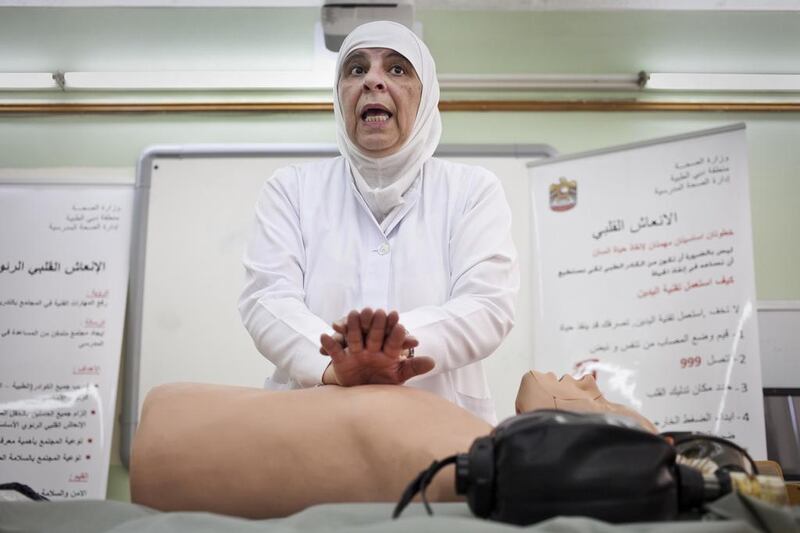Parents, experts and school administrators are calling for compulsory first-aid training for school staff to ensure children receive immediate care in an emergency.
There are no regulations requiring training, only that schools have a minimum number of healthcare professionals on site.
In Dubai, that means one full-time nurse and one part-time doctor for schools with up to 1,000 children, one full-time nurse and two full-time doctors for schools with up to 2,000 children, and two full-time nurses for every 1,000 children for schools with more than 2,000 pupils.
In Abu Dhabi, public schools have one nurse for every 650 students. In the Northern Emirates, the requirement is at least one nurse, one doctor and one on-call psychologist for every school.
Experts say this level of staffing with first aid knowledge is insufficient in an emergency.
Rebecca Smith, a certified first-aid trainer and a UK-educated paediatric nurse working with Safe Hands UAE, a family-services company in Dubai, said it was dangerous for schools to rely on nurses.
“The school nurse can’t be everywhere at once, so if anything happened to more than one child at one time, I don’t know how they would handle such a situation,” she said. “We’ve found that many schools were relying on their nurses and those who were certified were not refreshing their certificates, which should be done every two years.
“CPR techniques are constantly changing and need to be updated.”
School administrators agreed. Gitu Dasani, the science coordinator at the Indian High School’s junior campus, said relying on school nurses and the doctor might not be sufficient in an emergency situation. She said it was essential that teachers were properly trained.
“These days children are spending more time with their teachers, and this would enable them to respond at the right time in the right way,” she said. “First, the nurses may not be able to handle such a large number of casualties if there’s an incident. Second, it may take time for the nurse to arrive to the scene. If trained, the teacher could be qualified to do something immediately.”
Things in the UK operate differently, Ms Smith said.
“Over there, you’d have pretty much every staff member in the school trained. It’s very strict.”
While the department of education in Britain does not cite specific figures on the number of personnel required to be first-aid qualified, it does set out clear guidelines.
Schools are held legally accountable for ensuring an adequate number of trained personnel are on school grounds, taking into consideration not just the number of students, but also the design, structure and location of the building.
The guidelines also mention recommended first-aid ratios based on employee numbers set by the UK’s health and safety commission. There should be at least one qualified employee in low-risk workplaces with 50 to 100 employees, and at least one for every 50 employees in medium-risk workplaces with 20 to 100 employees.
Schools generally fall under the low-risk category.
Similarly, the Abu Dhabi Health, Safety and Environment Management System requires that worksites with between 101 and 1,000 employees have at least one first-aider and one registered nurse for every 100 employees. Schools, however, do not fall under its jurisdiction.
Abu Dhabi Education Council said it did not require teachers to have first-aid training because “the current laws and regulations are not supporting this direction”.
“Although school management are getting the ambulance department and sometimes private companies to provide awareness on first aid during the academic year … it is just for knowledge basis,” said Khaled Al Ansari, the school services division manager at the council.
“Schools are provided with school nurses who are licensed and competent by qualification and supported by laws and regulations to take this responsibility.”
Dubai works similarly, where any healthcare professional working in a school clinic should be certified in basic life support, first aid and fire safety.
Safe Hands has launched an emirate-wide non-profit initiative to train school staff and educate parents and children. For every 10 parents the school enrols in a free workshop, the company will train one teacher for free.
The main challenge for schools providing training to their staff, Ms Smith said, seemed to be funding.
“Everyone is really supportive, but then when it comes to the approval process for signing off on the costs things move really slow,” she said. “We did find that the process did speed up with the free courses.”
A typical eight-hour first-aid course costs about Dh600 per person, with companies often offering discounts for group training.
The Safe Hands initiative, which is being funded by the personal finance company Fund Advisers, began last month and has no budget.
“We would like to see pretty much every childcare professional in Dubai trained in the area of first aid,” Ms Smith said. “If there’s an incident that happens, they know how to handle that situation. Essentially it would be saving lives.”






